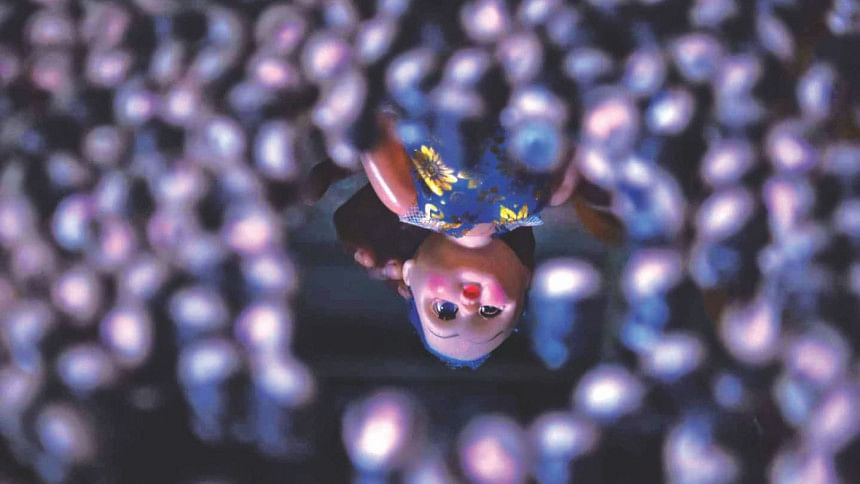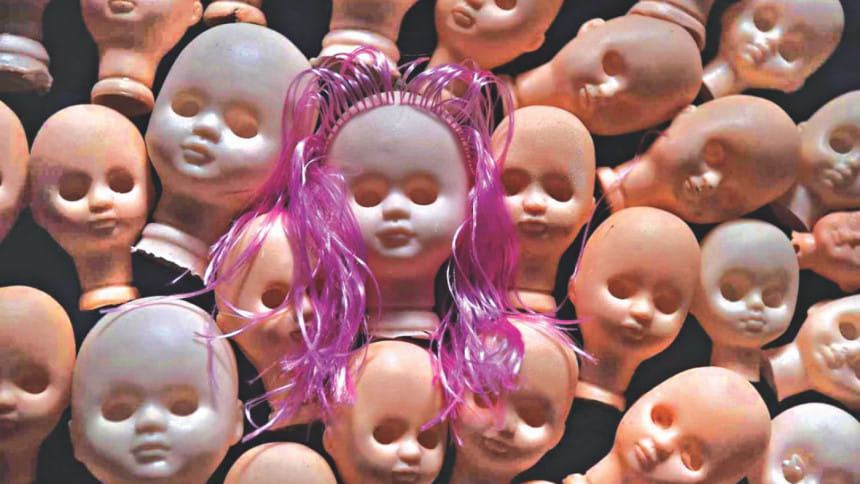Intimate acts of violence

“Don’t let strangers touch you.” And yet it is seldom strangers, I learned long before I was a teenager, who do you harm. It is always the ones closest to us: the suave chauffer, the skilled photographer, the kind music teacher, the good friend’s sober and dignified husband, the pious man of God. They are the ones your parents trust, whom they don’t want to believe anything against.” – Azar Nafisi
I’ve lost count of the number of times I’ve thought about sharing my sexual abuse experience in the last few years. What stopped me was my family; a Bengali Muslim family’s reaction to their daughter publicly admitting to the violation she had to endure as a seven-year-old. Somehow, and not surprisingly, it was more of the stigma around sexual abuse that bothered my parents, rather than the trauma of what I had been through. They were worried about how society would perceive me—tainted, a lifelong “bechari”, quickly forgetting the perpetrator and his repulsive actions, but always viewing me as a girl who had been dishonoured.
According to the National Sexual Violence Research Center, 34 percent of people who sexually abuse a child are family members of the child, and 93 percent of sexually abused children will be abused by someone they know and trust.
It didn’t help that my abuser was my cousin, my mum’s sister’s son, and the fear of a strained relationship, as well as the pity with which I would be viewed, kept my mum from addressing the issue with anyone. I still have vivid memories of the abuse: his dirty hands sliding into my skirt and aggressively making their way inside my panties, his mouth forcing the air out of mine and the continuous and painful rubbing of my flat chest. He used to lock me up in rooms inside houses full of relatives, houses that were supposed to be my safe places, to perform his perverse acts. His audacity took a deviant turn when he was joined by one of his cousins who had found a prey of his own; the two of them would act in pairs and make a show out of it. While one experimented with new ways to violate us, the other watched and then repeated it on the second girl. Till date I detest the corners of rooms where walls meet, which is where we would be forced to hide and partake in their nameless “games”.
During the course of my abuse and even before, I wasn’t fond of my cousin and found something dubious in his excessively sycophantic behaviour. I dreaded being a part of his games, and till date ask myself why I didn’t stand up to him, why I didn’t go talk to my mum. I realise now that it was because I didn’t fully understand what was happening to me and didn’t have the courage or language to describe the abuse. I was scared of a negative reaction from my parents, and terrified that the games he played with me would become more unbearable. What keeps coming back to me even now is the exact time these horrifying games came to an end—my mum had discovered me, drenched in sweat and panic after my cousin finished off with me at my grandmother’s house.
I can never erase the look of horror and helplessness on my mum’s face when she found me in that condition. She looked like someone who had died a thousand deaths in that one moment, unsteadied by the cruel shock of her reality, her entire body shaking as tremors traveled down her hands to her feet and her face drained of all colour. She composed herself quickly enough though, acutely aware of her presence in my grandmother’s house and all the relatives who were nearby.
What followed was a hushed and incomplete conversation between my mum and I—after she went through the details of what my cousin had done with me, I was made to promise that I would never go anywhere alone with him. In between sobs and words of regret, I was told that whatever he was doing would make me pregnant, and that was the end of our conversation. I was ashamed, panicked and physically broken, and was left with questions that wouldn’t be answered for the next 14 years: what were the games he was playing and why did I have to keep them a secret, why were my insides filled with sharp pangs when his hands opened up my private parts, and why was she not asking him about the games he had quietly bullied me into playing.

Although my mum never confronted my cousin, the abuse stopped right after; her constant watch on me must have alarmed him, and he found his way to other preys. A lack of outlet forced me to bury the trauma deep within myself, and I was foolish enough to think this would silence the horror and nausea that was growing inside me. In the years that followed, I became a polite and affectionate little sister to him; always friendly at our weekly family lunches and obedient when he would tutor me for my O’Level exams, but internally crumbling from the proximity of our interactions and the façade I had to keep up.
I was in my junior year at Mount Holyoke College, a liberal, all-women’s community in Massachusetts, US when I finally began to unbox the childhood trauma that had seeped only deeper into my bones in the last fourteen years. Mount Holyoke promised a physical and emotional separation from my life in Dhaka, which gave me the strength to share my story with friends, professors and most importantly, my therapist. I quickly understood how important it was for me to be removed from my family and a society that was built on rigid, stigma fueled norms, to be able to process the events of my childhood, a privilege that’s not afforded to many.
It took months of counseling for me to be able to have a conversation with my mum about the experiences I had bottled within myself. These thoughts had been suppressed so strongly that I didn’t realise how seamlessly they had blended into my being; my discomfort at intimacy with my partner, a silent depression that led to a prolonged sense of worthlessness, the quiet cynicism that was born off of my inability to truly trust anyone, and the panic I felt whenever I saw kids without parental supervision.
It took countless conversations, many of which I continue to have with my mum, to create a space that would treat both our emotions with respect and empathy. I realised that the anger she felt was very raw within herself, it hadn’t been processed because she didn’t know how to address it. She didn’t have resources to help her care for a child who had been sexually abused or the assistance she required as a parent to deal with the years of self-blame and regret she had internalised. She came from a society where the concept of providing help in the form of open discussions and counseling to overcome the distress associated with discovering that one’s child has been sexually abused was nonexistent.
What always bothered me was why I didn’t know what was happening to me was wrong, and what constituted as wrong. My parents had always told me to stay away from strangers, but didn’t tell me why I should be staying away from them in the first place. My parents’ unwillingness to divulge into this topic only confirms that this is an issue that has been taboo for generations and a problem that crosses all socioeconomic levels, religions, ethnic and cultural groups. Generations have grown up without the idea of consent, or what is considered abuse, and their experiences continue to live with them in the form of phobias and emotional trauma.
A part of me imagines a scenario where my mum sheds her apprehension to confront my aunt about her son’s actions, and what the likely outcome would’ve been—maybe some reprimanding, some apologies but ultimately a conversation they’d all be desperate to hide and forget. Although these conversations need to be initiated on an individual level, they’d be futile without the support of a society where dialogue surrounding abuse is a part of our internalised conscience, where parents are openly educated about how widespread a problem sexual abuse is.
Blame also falls on schools that play into this culture of silence and stigma and fail to prioritise early conversations with children about body safety. I attended one of Dhaka’s most prestigious schools for fifteen years, one that prided itself in providing the best opportunities for its students, leaving no stone unturned to ensure we had all the tools needed to succeed in life. But like most well reputed institutions in Dhaka, my school misjudged how information around sexual abuse would be pivotal in helping kids identify and even prevent the first instances of abuse. According to the Child Protection Research Department, out of all professionals, children are most likely to disclose their sexual abuse to teachers; but because sex education is completely excluded from our curriculum, children in Dhaka have no platform that they can use to initiate a conversation around body safety, let alone seek help for sexual abuse.
I’ve lived the last twenty years plagued with nightmares from my sexual abuse experience, and this has made me struggle with the concept of living without regrets. I can’t help but think of the past events of my life in what ifs; what if I had known and what if I had been able to stop it are thoughts that live in the darkest corners of my mind. These thoughts are always ready to trigger an attack that can lead to months of depression, or if it catches me on one of my better days, panic, nausea, and a crippling anxiety that makes me unsuitable for social interactions.
What continues to guide me through this ocean of helplessness and trauma are the companionship I’ve found in conversations and the resources I’ve received from professional help. I know like most victims of abuse, I’ll be on a lifelong journey of healing, and like me, all victims should at least have resources to help them fight the devastating effects of abuse, and not let the ramifications be indefinite. But why wait for it to get to that point, why not start a conversation around the epidemic of child sexual abuse now, one that can help kids set boundaries and say “no”, and hopefully save them from a life of cruelty and pain that no one deserves.
Sara Rashid, based in New York, is interested in how religion and politics shape art in South Asia.

 For all latest news, follow The Daily Star's Google News channel.
For all latest news, follow The Daily Star's Google News channel. 



Comments